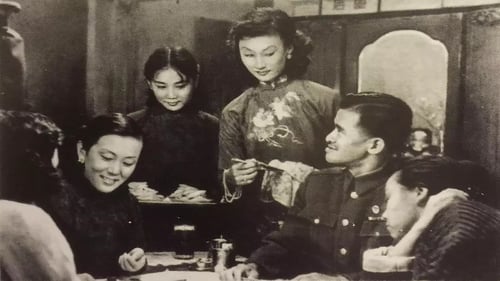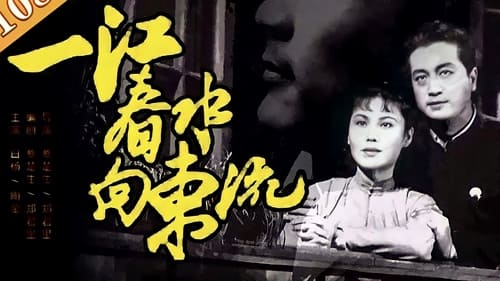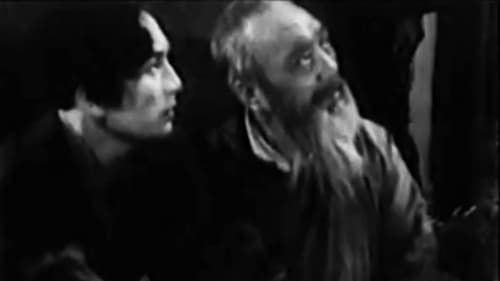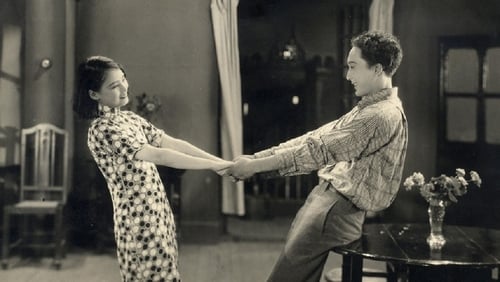Zheng Junli
출생 : 1911-12-05, Shanghai, China
사망 : 1969-04-23

Writer
Shot in gorgeous color, this fascinating communist flipside to fifties Hollywood music biopics chronicles the life and tragic early death of Nie Er, the composer of the PRC’s national anthem.

Director
Shot in gorgeous color, this fascinating communist flipside to fifties Hollywood music biopics chronicles the life and tragic early death of Nie Er, the composer of the PRC’s national anthem.

Director
A critical hit during one of China’s most politically charged periods, Zheng’s follow-up to his 1959 anniversary epics merged Soviet-style socialist realism with his own breakthroughs in film technique, specifically his use of continuous camera movement in the spirit of traditional Chinese scrolls. Tractor-kino at its finest, the film revolves around two rural lovers—one struck with a deadly disease—and their eventual survival thanks to socialist medical advances.

Director
China 1839. Because the British imports of opium into Southern China are creating such widespread medical and economic problems, the weak Manchu emperor Tao Kuang is forced to take action that precipitates the 'Opium War'.

Director

Screenplay
An absorbing example of genre filmmaking in the People’s Republic of China, Husband and Wife could at first glance be mistaken for any other romantic melodrama chronicling the rise and decline of a married couple’s love; here, though, that love takes place in (and is entirely defined by) a realm of political upheaval and Maoist ideology. A Shanghai intellectual marries an illiterate peasant woman–turned–collectivist hero, with outcomes both universal (differences emerge) and specific (revolutionary self-critiques). At first a popular hit, the film (and Zheng himself) was soon critically attacked for counterrevolutionary, pro-bourgeois thought. Zheng even penned a confessional autocritique, but the damage to his career was done. (BAMPFA)

Director
An absorbing example of genre filmmaking in the People’s Republic of China, Husband and Wife could at first glance be mistaken for any other romantic melodrama chronicling the rise and decline of a married couple’s love; here, though, that love takes place in (and is entirely defined by) a realm of political upheaval and Maoist ideology. A Shanghai intellectual marries an illiterate peasant woman–turned–collectivist hero, with outcomes both universal (differences emerge) and specific (revolutionary self-critiques). At first a popular hit, the film (and Zheng himself) was soon critically attacked for counterrevolutionary, pro-bourgeois thought. Zheng even penned a confessional autocritique, but the damage to his career was done. (BAMPFA)

Writer
At a Shanghai apartment, Mr Hou, a Nationalist official, gets ready to move to Taiwan upon the imminent defeat of the KMT during the Civil War. Mrs Hou gives an ultimatum to the rest of the tenants to move out on behalf of her husband, who is the "owner" of the flat and who is now planning to sell it. From the conversations with the rest, we find out that Hou has been a Hanjian during the Sino-Japanese War and that he has since taken over the apartment by force from the old landlord, Mr Kong. The tenants, including Mr Kong, Mrs Xiao, Little Broadcast (alias Mr Xiao, played by Zhao Dan) and a schoolteacher, Mr Hua, and his wife, initially plan to band together, but circumstances force them to find other ways out. Mr Hua tries to find a place to stay at the KMT-sponsored school he is teaching in. Little Broadcast and Mrs Xiao invest in black market gold. As the situation escalates, Mr Hua gets arrested by KMT agents and his young daughter falls desperately ill.

Director
At a Shanghai apartment, Mr Hou, a Nationalist official, gets ready to move to Taiwan upon the imminent defeat of the KMT during the Civil War. Mrs Hou gives an ultimatum to the rest of the tenants to move out on behalf of her husband, who is the "owner" of the flat and who is now planning to sell it. From the conversations with the rest, we find out that Hou has been a Hanjian during the Sino-Japanese War and that he has since taken over the apartment by force from the old landlord, Mr Kong. The tenants, including Mr Kong, Mrs Xiao, Little Broadcast (alias Mr Xiao, played by Zhao Dan) and a schoolteacher, Mr Hua, and his wife, initially plan to band together, but circumstances force them to find other ways out. Mr Hua tries to find a place to stay at the KMT-sponsored school he is teaching in. Little Broadcast and Mrs Xiao invest in black market gold. As the situation escalates, Mr Hua gets arrested by KMT agents and his young daughter falls desperately ill.

Writer
1930's China. The village of a poor family is taken over by the occupying Japanese army. One son, Zhongliang, leaves his wife and young son to join a medic group for the Chinese Army. The other son, Zhangmin goes into hiding to protect his family. The focus shifts back and forth from the brothers' parents and Zhongliang's wife and son to Zhongliang's newfound life of luxury in a town not too far away. The plight of Zhongliang's mother, his wife, Sufan and her son, Kongeson is contrasted with Zhongliang's rise in a flourishing company.

Director
1930's China. The village of a poor family is taken over by the occupying Japanese army. One son, Zhongliang, leaves his wife and young son to join a medic group for the Chinese Army. The other son, Zhangmin goes into hiding to protect his family. The focus shifts back and forth from the brothers' parents and Zhongliang's wife and son to Zhongliang's newfound life of luxury in a town not too far away. The plight of Zhongliang's mother, his wife, Sufan and her son, Kongeson is contrasted with Zhongliang's rise in a flourishing company.

厌战的日兵

Three stories about art stages. "Film City", "Drama Group" and "Dance Class".

A Chinese film

A silent Chinese feature film

Chen Zuo
In 1930, two sisters from the countryside, the serious Zhang Lan (Ruan Lingyu) and the frivolous Zhang Tao graduate from the secondary school where their mother Zhang Jie serves as principal. They both love their cousin Zuo, but have ambitions other than marriage. Their lives change dramatically when both attend university in Shanghai and encounter modern urban life and rapidly changing society. The film also depicts the emergence of Chiang Kai-shek's 1934 New Life Movement. Lianhua Film Studio did the film to appease the Nationalist Party which accused it of primarily presenting left-wing films, which was true.

Jun Zheng
중국의 제 2세대 감독 손유의 34년도 작품. [대로]는 도로 건설 현장에서 막일을 하는 노동자 진거와 그 친구들의 이야기를 담고 있다. 그들은 바위를 깨고 산을 뚫어 길을 닦는 혹독한 노동 현실에 놓여 있지만, 고통스러워하기 보다는 그것을 소명으로 여기고 즐겁게 받아들이는 청년들이다. 정의롭고 근면 성실한 ‘프론티어’ 정신으로 무장한 그들은 실직을 밥 먹듯 하지만 함께 있어 노래하며 일할 수 있는 건전한 정신과 육체적 활력을 가지고 있다. 이들을 주플롯으로 삼은 덕택에 계몽 영화적 성격이 지배적이지만 거기에는 청년 노동자들과 처녀들의 우정과 사랑, 연대를 강조하는 청춘 영화의 기운도 실려 있다. 그리고 후반부, 민족반역자가 내미는 돈의 유혹을 뿌리치고 기꺼이 고문을 선택하는 장면에서 민족적 항일 영화의 색채도 발견할 수 있을 것이다. 이는 윤리적, 교육적 가치전달을 우선시하는 당대 중국영화 주제 의식에 민족적, 이데올로기적 특성이 부가된 결과다. 일본의 공습으로 몰살당하는 결말도 비관적이지만은 않다. 곧바로 이어지는 진짜 결말은 ‘그들은 여전히 살아있다’는 생존자의 믿음에 따라 혼령들이 하나 둘씩 일어나 ‘투쟁하자, 건설하자’며 노래 부르며 일하는 모습이기 때문이다. 죽음조차 넘어선 그들의 소명 의식에서 당대 중국 영화의 교조적 강박과 중국 사회의 미래와 희망을 엿볼 수 있을 것이다. 시종일관 즐겁고 유머러스한 활기를 띠는 이 영화는 당대 중국이 처한 어두운 현실조차도 즐겁게 노래할 수 있는 능력을 보여준다. 그것은 무성영화의 청각적 단조로움을 몇 개의 뮤지컬 코드와 코믹한 효과음으로 대체하는 것으로 가능했다. 무엇보다 이 영화의 가장 큰 즐거움은 1930년대 상하이 영화계를 주름잡은 조선인 ‘영화황제’ 김염의 모습을 보는 일일 것이다. 내내 달콤한 미소를 짓고 있는 그의 부드러운 카리스마가 어떻게 중국 대륙을 사로잡았는지 짐작하고도 남는다. 강소원(영화평론가)

Yu Haichou
Overnight, the sexy Wei Ming will become a successful novelist. But, desperate to get the money that she needs to cure her little daughter (and harassed by a rich, unscrupulous rake), she will end up eventually engage in luxury prostitution.

郑君

Song Ke
A warlord's nephew lusts for farmer Song Ke's sister. When Song refuses, the whole family is thrown into jail and the sister commits suicide. The father dies of grief and Song lives with his cousin abroad. The warlord's nephew loses power and also escapes to the same country.

Pink Dream tells the story of a young novelist who is supported by a loving and hard-working wife. The novelist, however, is drawn to the decadent life of a socialite who introduces him to the dance halls that dot Shanghai. As the film progresses, the novelist soon learns of the emptiness of this urban existence and rejects it as a "pink dream."

Zheng
A Chinese couple in the 1930s struggle to survive. Things get complicated for them when he enlists to fight the war against Japan.

Сяо Ли
A wild country girl moves to Shanghai with her painter boyfriend and experiences exploitation and poverty.

三子















